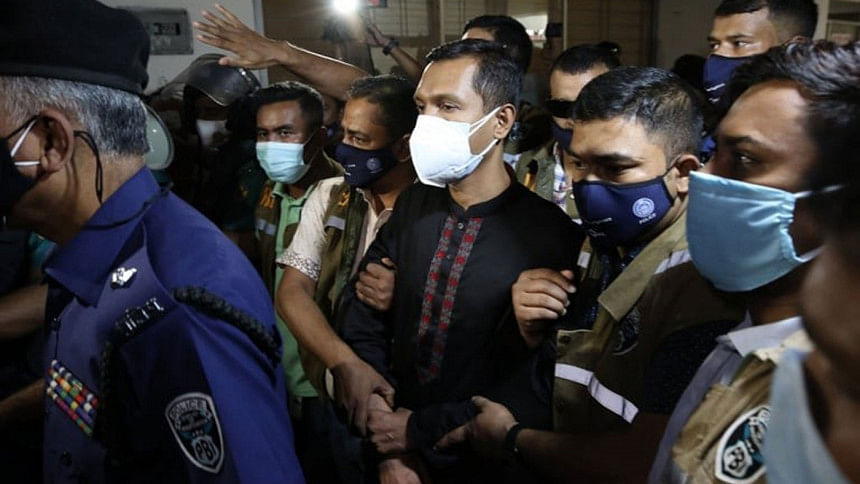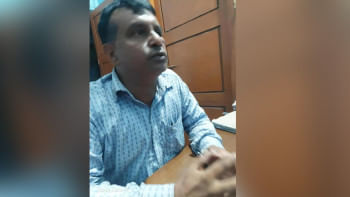The case against SP Babul Akter

The complainant is now complained against. This dramatic development, however, does not come as a total surprise because, in the informed quarters, there was a continuing suspicion of the veracity of the complainant's version of the incident that allegedly led to the killing of his wife in 2016 in broad daylight in Chattogram city. We are talking about the arrest and remand of former Superintendent of Police (SP) Babul Akter, who had earlier lodged a murder complaint accusing some unidentified criminals, without furnishing credible and cogent motives for the murder of his wife.
It may be recalled that SP Babul Akter was very much under the cloud of suspicion immediately after the murder. Reportedly, a high-powered committee, formed by the commissioner of Chattogram Metropolitan Police to enquire into the incident, found traces of culpability in the conduct and actions of the complainant husband, and accordingly sent a report to the Police Headquarters.
At the Police Headquarters, some senior police officers reportedly interrogated Babul Akter and they also did not find the actions and submissions of the said officer above board. In short, Babul's version of the incident supposedly occurring due to his actions taken against terrorists and criminals was not found to be credible. He was, however, not charged for criminal actions, as sufficient evidence pointing to his culpability was not forthcoming at the time. The officer reportedly resigned which was accepted by the government, although there were speculations that he was, in fact, eased out of public service for unbecoming conduct and disturbing accusations pointing to his probable involvement in the conspiracy to commit the murder of his wife.
In spite of what has happened during the time since May 2016, when the unfortunate murder took place, the redeeming feature as of now is the Police Bureau of Investigation's non-acceptance of the version given by the accused officer, as well as the registration of a regular case for murder and conspiracy and the arrest and remand of the suspect. At the time of writing this piece, it has been learnt that Babul Akter declined to judicially confess his involvement in the murder conspiracy. This was only natural, the accused being an investigator of some experience himself and suspected to be criminally disposed.
It would be pertinent to mention here that judicial confession, even if given by an accused, is not a strong piece of evidence in the absence of credible material and oral corroboration, and almost invariably runs the risk of being retracted during the trial process. The need, therefore, quite clearly, is the unearthing of the conspiracy and resultant commission of the murder. So when this writer is urging a robust investigation, the import is that the investigation should move, in earnest, from the evidence to the accused and not otherwise.
According to media reports in this regard, the source of the accused officer who allegedly hired the killers has been able to evade arrest thus far. Therefore, the arrest of this individual is strongly likely to unearth the motive and conspiracy of the murder. Any experienced investigator would know about the needful to be done following the apprehension of an abettor of criminal conspiracy.
This writer would recommend caution in the process of investigation. It needs to be mentioned that the rule of law, in its application to the criminal process, is primarily concerned with the protection of the rights of the accused persons and not of the victims, and upholding civil liberties of the citizens. To many, both the rule of law and its subservient criminal jurisprudence are unequivocally in favour of the offenders, the criminals, the lawbreakers, the accused. Experts say that the dice, from the very beginning, is loaded against the effectiveness of investigation.
In a case where the charge against the accused is one of murder, in the normal course, it may not be possible to convict the accused on circumstantial evidence without adducing direct evidence. Though there is no legal infirmity in basing conviction only on circumstantial evidence, it has to be satisfied that the circumstances from which the inference of guilt is to be drawn have been fully established by unimpeachable evidence beyond a shadow of doubt. We have to remember that the accused is not to prove his case but has simply to give a reasonable explanation to the charge.
Admittedly, investigators have a difficult task at hand. They have to come with flying colours in the interest of honest and truthful investigation as also the ethos of public service.
Muhammad Nurul Huda is a former IGP of Bangladesh.

 For all latest news, follow The Daily Star's Google News channel.
For all latest news, follow The Daily Star's Google News channel. 



Comments